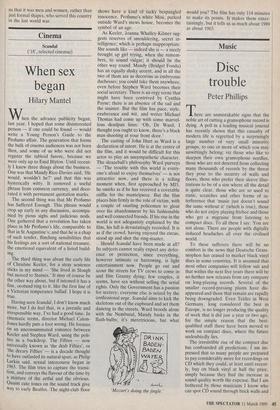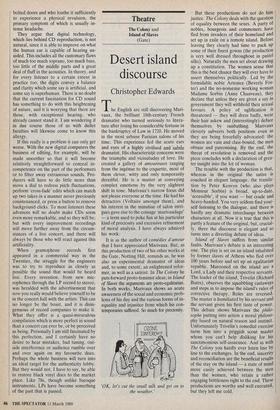Music
Disc trouble
Peter Phillips
here are unmistakable signs that the noble art of cutting a gramophone record is dying. A poll in a leading musical journal has recently shown that this casualty of modern life is regretted by a surprisingly large number of very small minority groups, to one or more of which you may unwittingly belong: viz those who like to sharpen their own gramophone needles, those who are not deterred from collecting many thousands of records by the threat they pose to the security of walls and floors, those who prefer their sleeve illus- trations to be of a size where all the detail is quite clear, those who are so used to static, scratches and other forms of in- terference that 'music just doesn't sound the same without it' (which is true), those who do not enjoy playing frisbee and those who get a migraine from listening to compact discs. To all these I say: You are not alone. There are people with digitally induced headaches all over the civilised world.
To these sufferers there will be no comfort in the news that Deutsche Gram- mophon has ceased to market black vinyl discs in some countries. It is assumed that most other companies will follow suit and that within the next five years there will be no further new releases from any company on long-playing records. Several of the smaller record-pressing plants have dis- appeared and those that remain are rapidly being downgraded. Even Teldec in West Germany, long considered the best in Europe, is no longer producing the quality of work that it did just a year or two ago, for the simple reason that the best- qualified staff there have been moved to work on compact discs, where the future undoubtedly lies.
The irresistible rise of the compact disc has confounded all predictions. I am im- pressed that so many people are prepared to pay considerably more for recordings on CD which they could, at least until recent- ly, buy on black vinyl at half the price, simply because they find the increase in sound quality worth the expense. But I am bothered by those musicians I know who can spot CD sound through brick walls and bolted doors and who loathe it sufficiently to experience a physical revulsion, the primary symptom of which is usually in- tense headache.
They argue that digital technology, Which lies behind CD reproduction, is not natural, since it is able to improve on what the human ear is capable of hearing un- aided. This includes all the customary flaws of much too much soprano, too much bass, toil) little of the middle parts and a great deal of fluff in the acoustics. In theory, and for every listener to a certain extent in practice too, the digits convey a balance and clarity which some say is artificial, and some say iS superhuman. There is no doubt that the current fascination for CD sound has something to do with this heightening of nature, and it is worrying that there are those, with exceptional hearing; whO already cannot stand it. I am wondering if in due course those of us with duller faculties will likewise come to know this allergy.
If this really is a problem it can only get worse. With the new digital computers the business of editing, for example, will be made smoother so that it will become relatively straightforward to conceal in- competence on the part of the performers Or to filter away extraneous sounds. Pro- ducers will have to do little more than move a dial to redress pitch fluctuations, perform 'cross-fade' edits which can match up two takes in a manner, never previously countenanced, or press a button to remove background clicks. To most listeners these advances will no doubt make CDs seem even More remarkable, and so they will be; but with every improvement recordings will move further away from the circum- stances of a live concert, and there will always be those who will react against this
When gramophone records first appeared in a commercial way in the Twenties, the struggle for the engineers was to try to reproduce as closely as possible the sound that would be heard five. Every invention, from new mic- rophones through the LP record to stereci, was heralded with the advertisement that now you really would believe yourself to be in the concert hall with the artists. ThiS can no longer be the boast, and it is disin- genuous of record companies to make 'it. What they offer is a quasi-miraculous compilation which is more perfect in sound than a concert can ever be, or be perceived as being. Personally I am still faSciriated by this perfection, and I certainly have no desire to hear mistakes, bad tuning, out- side interference or audience rumble over and, over again on my favourite discs. Perhaps the whole business will turn into an ideal target for the authenticity lobby. But they would not, I have to say, be able to restore black vinyl discs to the market place. Like 78s, though unlike baroque instruments, LPs have become something of the past that is passed.



























































 Previous page
Previous page